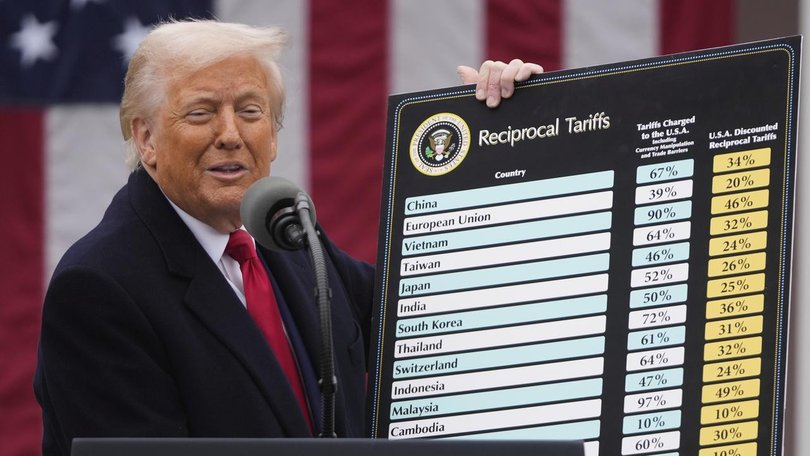Donald Trump hit with court ruling declaring his tariffs illegal in latest legal and political setback
A US appeals court has delivered a major blow to Donald Trump’s trade war, ruling his tariffs illegal but keeping them in place while appeals play out.

A US court has ruled that most of Donald Trump’s tariffs are illegal but can remain in place for now to allow appeals.
Mr Trump has made tariffs a pillar of US foreign policy in his second term, using them to exert political pressure and renegotiate trade deals with nations that export goods to the United States.
The tariffs have given the Trump administration leverage to extract economic concessions from trading partners but have also increased volatility in financial markets.
Sign up to The Nightly's newsletters.
Get the first look at the digital newspaper, curated daily stories and breaking headlines delivered to your inbox.
By continuing you agree to our Terms and Privacy Policy.“The statute bestows significant authority on the President to undertake a number of actions in response to a declared national emergency, but none of these actions explicitly include the power to impose tariffs, duties, or the like, or the power to tax,” the court said.
The court allowed the tariffs to remain in place through October 14 to give the Trump administration a chance to file an appeal with the US Supreme Court.
The decision from the US Court of Appeals for the Federal Circuit in Washington DC addressed the legality of what Mr Trump calls “reciprocal” tariffs imposed as part of his trade war in April, as well as a separate set of tariffs imposed in February against China, Canada and Mexico.
The court’s decision does not impact tariffs issued under other legal authority, such as Mr Trump’s tariffs on steel and aluminium imports.
The case is widely is expected to be appealed in the US Supreme Court.
Mr Trump justified both sets of tariffs, as well as more recent tariffs, under the International Emergency Economic Powers Act. IEEPA gives the president the power to address “unusual and extraordinary” threats during national emergencies.
“It seems unlikely that Congress intended, in enacting IEEPA, to depart from its past practice and grant the President unlimited authority to impose tariffs,” the ruling said.
“The statute neither mentions tariffs (or any of its synonyms) nor has procedural safeguards that contain clear limits on the President’s power to impose tariffs.”
The 1977 law had historically been used for imposing sanctions on enemies or freezing their assets.
Mr Trump, the first president to use IEEPA to impose tariffs, says the measures were justified given trade imbalances, declining US manufacturing power and the cross-border flow of drugs.
Mr Trump’s Department of Justice has argued the law allows tariffs under emergency provisions that authorise a president to “regulate” imports or block them completely.
Mr Trump declared a national emergency in April over the fact that the US imports more than it exports, as the nation has done for decades.
Mr Trump said the persistent trade deficit was undermining US manufacturing capability and military readiness.
He said the February tariffs against China, Canada and Mexico were appropriate because those countries were not doing enough to stop illegal fentanyl from crossing US borders, an assertion the nations have denied.
The appeals court ruled on two cases, one brought by five small US businesses and the other by 12 Democratic-led US states, which argued IEEPA does not authorise tariffs.
The Constitution grants Congress, not the president, the authority to impose taxes and tariffs, and any delegation of that authority must be both explicit and limited, according to the lawsuits.
The New York-based US Court of International Trade ruled against Mr Trump’s tariff policies on May 28, saying the president had exceeded his authority when he imposed both sets of challenged tariffs.
The three-judge panel included a judge who was appointed by Mr Trump in his first term.
Another court in Washington ruled that IEEPA does not authorise Mr Trump’s tariffs, and the government has appealed that decision as well.
At least eight lawsuits have challenged Mr Trump’s tariff policies, including one filed by the state of California.
